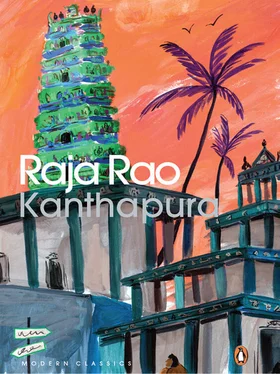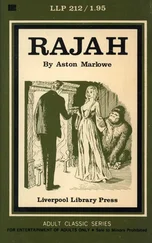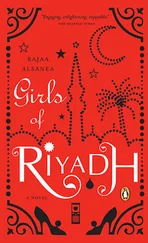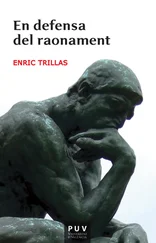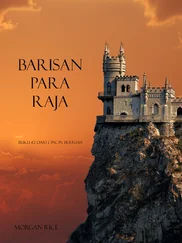Raja Rao - Kanthapura
Здесь есть возможность читать онлайн «Raja Rao - Kanthapura» весь текст электронной книги совершенно бесплатно (целиком полную версию без сокращений). В некоторых случаях можно слушать аудио, скачать через торрент в формате fb2 и присутствует краткое содержание. Год выпуска: 2014, Издательство: Penguin, Жанр: Классическая проза, на английском языке. Описание произведения, (предисловие) а так же отзывы посетителей доступны на портале библиотеки ЛибКат.
- Название:Kanthapura
- Автор:
- Издательство:Penguin
- Жанр:
- Год:2014
- ISBN:нет данных
- Рейтинг книги:3 / 5. Голосов: 1
-
Избранное:Добавить в избранное
- Отзывы:
-
Ваша оценка:
- 60
- 1
- 2
- 3
- 4
- 5
Kanthapura: краткое содержание, описание и аннотация
Предлагаем к чтению аннотацию, описание, краткое содержание или предисловие (зависит от того, что написал сам автор книги «Kanthapura»). Если вы не нашли необходимую информацию о книге — напишите в комментариях, мы постараемся отыскать её.
Kanthapura — читать онлайн бесплатно полную книгу (весь текст) целиком
Ниже представлен текст книги, разбитый по страницам. Система сохранения места последней прочитанной страницы, позволяет с удобством читать онлайн бесплатно книгу «Kanthapura», без необходимости каждый раз заново искать на чём Вы остановились. Поставьте закладку, и сможете в любой момент перейти на страницу, на которой закончили чтение.
Интервал:
Закладка:
The next time he felt like that was when he had those terrible floods, and he had, he told us later, seated himself by the river and said, ‘I may be drowned, but I shall not rise, Mother Himavathy, till thy waters are sunk down to thy daily shores.’ And who will say the waters did not sink back that very evening? But no other such vision of the holy had he till that holy vision of the Mahatma.
But this morning his soul sounded deeper still. Why? — he began to ask himself. No answer came, but he merged deeper into himself and radiance poured out of his body and he seemed to rise sheer into the air. He floated and floated in it, and he felt he could fly so far and so free that he felt a terror strike his being and, suddenly perspiring, he drew his soul back to the earth, and, opening his eyes, touched his limbs and felt his face and hit the floor to feel he was alive. But he had caught a little of that primordial radiance, and through every breath more and more love seemed to pour out of him.
That was why, when Ratna came to see him, he felt there was something different in his feelings towards her. Her smile did not seem to touch his heart with delicate satisfaction as it did before. She seemed something so feminine and soft and distant, and the idea that he could ever think of her other than as a sister shocked him and sent a shiver down his spine. But Ratna looked at him sadly and shyly, and whispered, ‘Is there anything I can do?’ and Moorthy answered, ‘Pray with me that the sins of others may be purified with our prayers.’ She could hardly grasp his idea. She was but fifteen. Praying seemed merely to fall flat before the gods in worship. So she said she would make ten more prostrations before the gods, and when her mother came along, she stood silent, and once Seethamma had finished her circumambulations, they smiled to Moorthy and walked back home.
Rangamma came as the cattle were being driven to the fields, and she brought with her a handful of salt. Moorthy poured a little water into his tumbler, and throwing in a pinch of salt, swallowed it all, crying, ‘Rama-Krishna, Rama-Krishna.’ But the coolness in his empty stomach made him shiver. Then a warmth rose in his veins and he felt strength streaming into his limbs. Rangamma again tried to persuade him to eat a little—’just not to be too weak for even the dharma sastras permit it,’ she said. But Moorthy had little strength to answer her, and he simply smiled back, saying, ‘Nay’. And when she came back in the evening there were already around Moorthy, Pariah Rachanna and Beadle Timmayya and Patel Rangè Gowda, and Doré, who had just come back from one of his tours. And Doré laughed and mocked at Moorthy, saying it was not for a university fellow to play all these grandma’s tricks. But they silenced him. And then there were also there the other boys Kittu and Ramu and Postmaster’s Seetharamu and our Seenu and Devaru’s son, Subbu, and Moorthy sat among them smiling and calm, saying a word now and again. But strength was going out of his breath and his face began to grow shiny and shrivelled, and when dusk fell they all left him, and it was only Rangamma that went to sit near him for one moment in silence. ‘The great enemy is in us, Rangamma,’ said Moorthy, slowly, ‘hatred is in us. If only we could not hate, if only we would show fearless, calm affection towards our fellow men, we would be stronger and not only would the enemy yield, but he would be converted. If I, alone, could love Badè Khan, I am sure our cause would win. Maybe — I shall love him — with your blessings!’ Rangamma did not understand this, neither, to tell you the truth, did any of us. We would do harm to no living creature. But to love Badè Khan — no, that was another thing. We would not insult him. We would not hate him. But we could not love him. How could we? He was not my uncle’s son, was he? And even if he were.
The next day Moorthy was weaker still. But Bhatta, furious that Moorthy was pretending to be pious, tried to talk to him and when Moorthy, smiling, just said, ‘Bhattarè I am weak: I shall explain this to you another time,’ Bhatta insulted him and swore he would beat the drum and denounce this cat’s conversion to asceticism. But Moorthy simply smiled back again, for love was growing in him.
On the third day such exaltation came over him that he felt blanketed with the Pariah and the cur. He felt he could touch the stones and they would hang to his hands, he felt he could touch a snake and it would spread its sheltering hood above him. But as he rose he felt such a dizziness enter his head that he had to hold to the wall to move, and when he sat down after the morning prayers he felt his heart beating itself away. His eyes dimmed and the whole temple seemed to shake and sink, and the fields rose up with crops and canals and all stood in the air while the birds seemed to screech in desolation. And as he lay back on his mat, a languor filled his limbs and he felt the earth beneath him quaking and splitting. When he awoke he saw Rangamma and our Seenu and Ratna all in tears, and he moved his head and asked, ‘What’s all this?’ and Rangamma, so happy that he had at last awakened from his swoon, smiled back at him and said there was nothing the matter, and as he turned towards the courtyard he saw Pariah Rachanna and Lingayya standing with joined palms. Something was the matter, thought Moorthy, and holding to the pillar he slowly sat up, and he saw the sunshine flooding through the valley, while the bulls and buffaloes were husking paddy by the haystacks, and the canal water ran muddy as ever, and up the Bebbur mound the empty footpath, quivering in the heat, ran up into the Skeffington Coffee Estate. Then suddenly he broke into a fit of sobs, and they stood round him and asked, ‘What’s the matter? What?’ and Moorthy would not answer. For somewhere behind the dizzy blare was a shadow that seemed to wail like an ominous crow, and he broke into sobs in spite of himself. Then Rangamma took an orange from her sari-hem and offered it to Moorthy imploringly, and Moorthy looked at it distraught.
‘An orange. This is an orange, Rangamma. And I cannot eat an orange,’ he said, and Rangamma thought, ‘Well, he has lost his reason.’ But Moorthy grew calmer, and he said, ‘Give me a little salted water. There is river water in this pot.’ And as they gave it to him, he held the tumbler long in his hands, and then slowly lifting it up to his lips, he drank one gulp, then another, and then another, and at each sip he seemed to feel light coming to his eyes, and such perspiration poured out from him that he laid himself down and covered himself gently, and sank back to sleep, and Rangamma said to Ratna, ‘Sit in the courtyard, my daughter, and watch when he wakes. I have to go and cook.’ At which Ratna was so happy and so proud that she sat by the bull and began to pray. ‘God, God,’ she said, ‘keep him strong and virtuous, and may he rise out of this holier and greater; God, I shall offer ten coconuts and a kumkum worship. God, keep him alive for me.’ Then she rose and fell prostrate before the gods in the sanctum.
By the evening, the critical period being over, Moorthy felt stronger and he said to Rangamma, ‘Rangamma, if we had a bhajan this evening?’ and Rangamma said, ‘But Moorthy, you are weak’—to which Moorthy replied, ‘No, I’m weak no more. And if I am weak, Seenu will lead the bhajan.’ And as dusk fell, Seenu lighted the oil lamps of the sanctum, and going up the promontory he rang the bell and blew the conch, and men came from the Potters’ street and the Brahmins’ street and the Weavers’ street and the Pariah street; but Vasudev and Gangadhar were the only ones to come from the Skeffington Coffee Estate.
But later, Badè Khan came, too, to join them.
When the bhajan was over and Seenu was taking round the camphor censer, Moorthy observed how poor the Brahmin corner was. Neither Patwari Nanjundia nor Temple Nanjappa nor Schoolmaster Devarayya were there, nor their wives nor their children. The short, round picture of Bhatta came to his mind, but he put it away and thought of God. He would send out love where there was hatred and compassion where there was misery. Victory to the Mahatma!
Читать дальшеИнтервал:
Закладка:
Похожие книги на «Kanthapura»
Представляем Вашему вниманию похожие книги на «Kanthapura» списком для выбора. Мы отобрали схожую по названию и смыслу литературу в надежде предоставить читателям больше вариантов отыскать новые, интересные, ещё непрочитанные произведения.
Обсуждение, отзывы о книге «Kanthapura» и просто собственные мнения читателей. Оставьте ваши комментарии, напишите, что Вы думаете о произведении, его смысле или главных героях. Укажите что конкретно понравилось, а что нет, и почему Вы так считаете.
